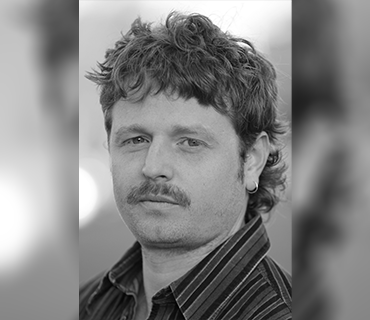
Author Tobias McCorkell spent the first 25 years of his life in Coburg, Melbourne. He has taught creative writing at the University of Melbourne and has authored works of non-fiction. In 2018 he appeared at the Melbourne Emerging Writer’s Festival. He is the recipient of a 2019 Varuna Residency Fellowship. ‘Everything in its Right Place’ is his first novel.
‘Everything in its Right Place’ (Transit Lounge) tackles themes of class, love and sexuality with humour, truth and grit. It is a story of the legacies and dilemmas that families bring, of how we all must find our own way.
Ford McCullen is growing up with his mother Deidre and his Pop and Noonie in ‘The Compound’, a pair of units in the shadow of Pentridge prison. His father, Robert, has left them to live in the bush with his new male partner. Nobody is coping. When Ford’s paternal grandmother Queenie’s good fortune allows him to attend a prestigious Catholic private school on the other side of the river and to learn the violin, Ford finds himself balancing separate identities. At school he sees himself being moulded into an image that is not his own, something at odds with the rough and tumble of his beloved north.
Crumbling under the weight of his family’s expectations and realising that he just might be the only adult amongst them, Ford embarks on a quest for meaning while navigating the uncomfortable realities of his father’s life, his mother’s ongoing crisis, and the pillars of football and religion, delving ever deeper into a fraught search for the source of the ‘McCullen curse’.
Q: Your novel is primarily set in Coburg, where you grew up. Author Cate Kennedy says, “A story can’t get started until we know where we are, and why it matters,” putting the emphasis firmly on place. How important was it to have grown up in Coburg, when writing ‘Everything in its Right Place’?
A: It was essential. I’m obsessed with place and agree wholeheartedly with Kennedy’s quote. The word ‘place’ even appears in my title! In writing this book, I wanted to show that you could make somewhere small an epicentre, that in literary terms there’s no difference between Coburg and Brooklyn or Melbourne and Paris, and that writing locally could be a creatively rich experience. Not every novel needs to be set in London or New York. And anyway, those settings have been done to death.
Q: Because the story takes place in a world you grew up in, did that orient you towards basing characters on people you knew?
A: This is tricky. Every character is almost like an extension of myself, in an odd way – an extension, as well as an expansion of either an emotion or a philosophical principle that’s contained within me. I see my characters as arguments for how to be or how not to be in the world. Undoubtedly, though, a writer can only write people (his characters) based on the interactions he’s had with the people in his life, so those human interactions become the natural basis for how you might represent people and their behaviour on the page.
Q: In your book, do you feel that the places and characters are intimately connected?
A: Yes. I think, and you’re always hoping for an interplay between foreground and background, but I think the settings echo the different feelings or personal crises or thoughts of the characters in them. Given that the novel stays with its protagonist, Ford, I feel you can certainly see his mood change setting to setting.
Q: You write non-fiction as well as fiction. Do you find the two genres have some common ground, with writing skills you utilise across both?
A: On the technical side of things, yes – your skill base is the same across the two. But creatively and emotionally, no – the process for each, so far in my experience, is entirely different. Where my mind, mood and heart is at, it’s with fiction writing. Fiction writing gets me, and I get it. Except for the exhaustion that inevitably sets in when writing a manuscript and sticking to a vigorous writing schedule, fiction writing is mostly a natural and effortless task.
Q: If you had to choose just one sentence from ‘Everything in its Right Place’, what is the sentence or phrase in your book that resonates most strongly for you?
A: This is an impossible question, as the entire novel is my response to being in the world and to how I feel. But if I was pressed to pinpoint a specific passage, then it’s one that comes toward the end of the novel and pertains to memory, as well as to the fact we can never know what someone else is thinking: “The spaces between people were vast, and these spaces made them unknowable … What was the point in remembering a thing that everyone else would forget?”
‘Everything In Its Right Place’ is available from Transit Lounge publishers now.
